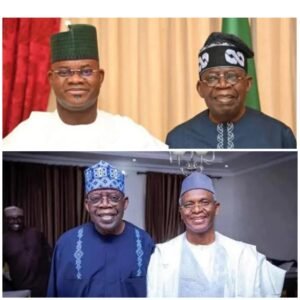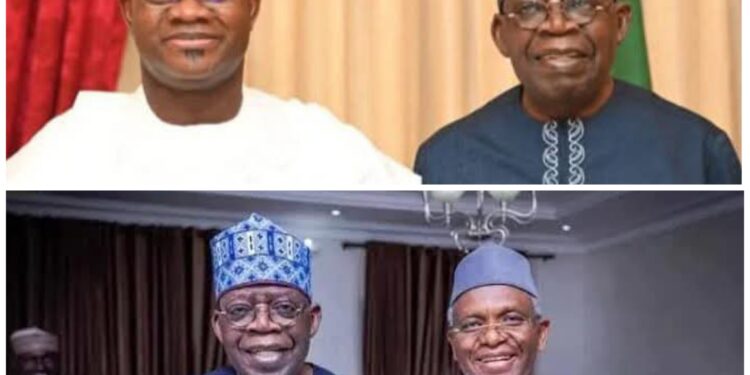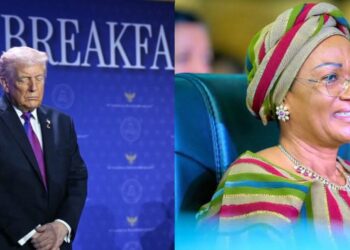
By Ibrahim Kegbegbe
In Nigerian politics, loyalty often comes with the expectation of reward. Political heavyweights who invest their influence and resources in elections typically anticipate key government positions in return. However, the cases of Yahaya Bello, former Governor of Kogi State, and Nasir El-Rufai, former Governor of Kaduna State, present a fascinating contrast in how political allies of President Bola Tinubu have been treated post-election—and how they have responded to their respective fates.
Bello, despite facing legal battles, has remained largely silent and has continued to show allegiance to the administration. On the other hand, El-Rufai, who was nominated for a ministerial position but rejected by the Senate, has taken a more confrontational approach, publicly criticizing the government. This article examines the divergent paths of these two political figures and what their cases reveal about power, loyalty, and entitlement in Nigerian politics.
Yahaya Bello: Loyalty Amidst Legal Troubles
During the 2023 elections, Yahaya Bello stood firmly behind Bola Tinubu, defying the financial policies of former Central Bank Governor Godwin Emefiele that many believed were targeted at frustrating Tinubu’s campaign. Bello was among the governors who took legal action against Emefiele’s naira redesign policy, a move that arguably helped Tinubu navigate a challenging electoral landscape.
Beyond legal action, Bello worked hard to secure Kogi State for Tinubu in the presidential election. Given his efforts, many believed he would be rewarded with a prominent position in the administration. However, not only has he received no appointment, but he is also facing corruption charges brought by the Economic and Financial Crimes Commission (EFCC). Despite this, Bello has remained politically restrained, avoiding public criticism of Tinubu. He recently attended the National Economic Council (NEC) meeting, signaling continued alignment with the administration.
Bello’s approach suggests that he is playing the long game—remaining loyal and biding his time for a potential political rehabilitation. In Nigerian politics, silence can sometimes be as strategic as noise.
Nasir El-Rufai: A Clash with the Tinubu Administration
El-Rufai’s political journey under Tinubu has been starkly different. Like Bello, he played a crucial role in Tinubu’s electoral success, particularly in the North. However, his political career hit a stumbling block when his ministerial nomination was rejected by the Senate, reportedly due to security concerns. This rejection appears to have marked the beginning of a strained relationship between El-Rufai and the Tinubu administration.
In the months following his rejection, El-Rufai has made several statements indirectly criticizing the government. His public remarks suggest discontent, and many interpret them as a reaction to being sidelined after years of political service. His allies have also hinted at a sense of betrayal, questioning why a key figure in Tinubu’s victory was denied a place in the administration.
Unlike Bello, El-Rufai has chosen confrontation over quiet allegiance. Whether this approach will earn him political leverage or further alienate him remains uncertain.
Contrasting Political Approaches: Silence vs. Confrontation
The cases of Bello and El-Rufai highlight two contrasting approaches to political disappointment in Nigeria: silence and continued loyalty versus vocal opposition and defiance.
Bello’s silence suggests that he is willing to endure temporary setbacks in hopes of future redemption. This strategy has worked for many Nigerian politicians in the past, as political tides can shift with time.
El-Rufai’s vocal dissatisfaction, on the other hand, puts pressure on the Tinubu administration but also risks isolating him further. In Nigerian politics, public criticism of an incumbent president often comes with consequences.
This contrast raises questions about the effectiveness of different political survival strategies. Is it better to stay quiet and hope for rehabilitation, or to speak out and demand recognition?
The Politics of Reward and the Tinubu Factor
President Tinubu is known for rewarding loyalty, but his administration’s approach to political compensation appears selective. While some key supporters have secured appointments, others—like Bello and El-Rufai—have faced political setbacks.
This selective reward system suggests that Tinubu’s government is prioritizing political stability over blind loyalty. Figures perceived as liabilities, whether due to legal troubles (as in Bello’s case) or potential internal disruptions (as in El-Rufai’s case), may not fit into the administration’s plans.
A Lesson for Nigerian Politicians
The diverging fates of Yahaya Bello and Nasir El-Rufai offer an important lesson in Nigerian politics: loyalty does not always guarantee immediate reward, and political survival depends on strategy. While Bello has chosen silence and alignment, El-Rufai has taken a path of vocal resistance. Only time will tell which approach proves more effective under Tinubu’s administration.
For political actors in Nigeria, the question remains: when faced with rejection, is it better to wait patiently or to challenge the system? The answer may define the political futures of many within Tinubu’s inner circle.

















